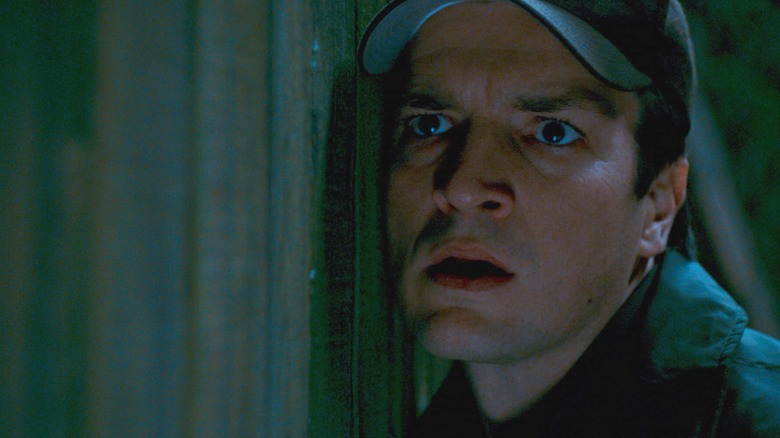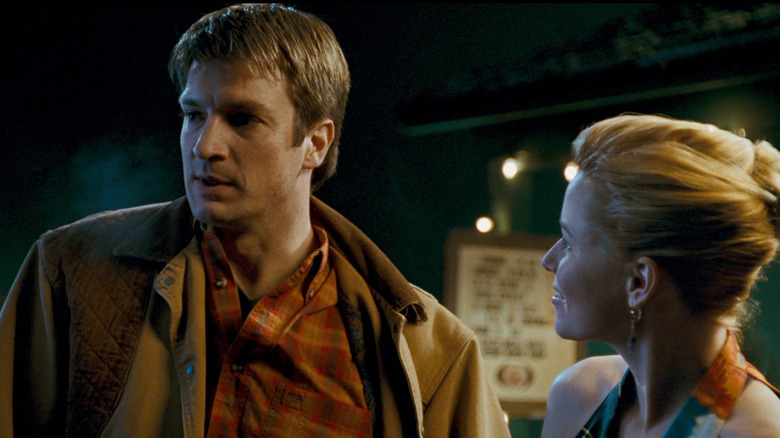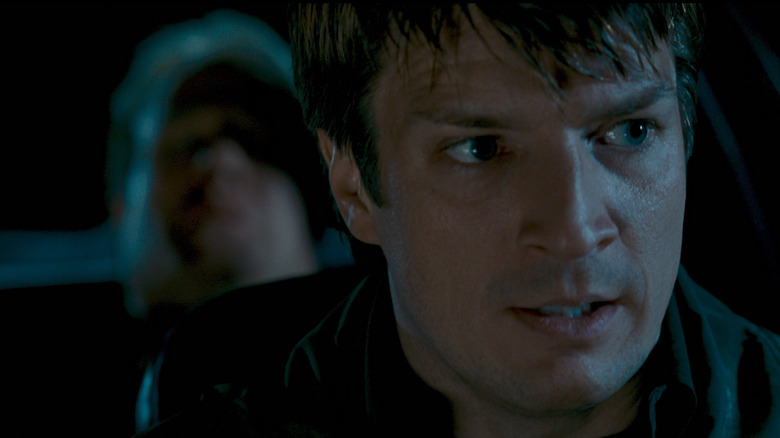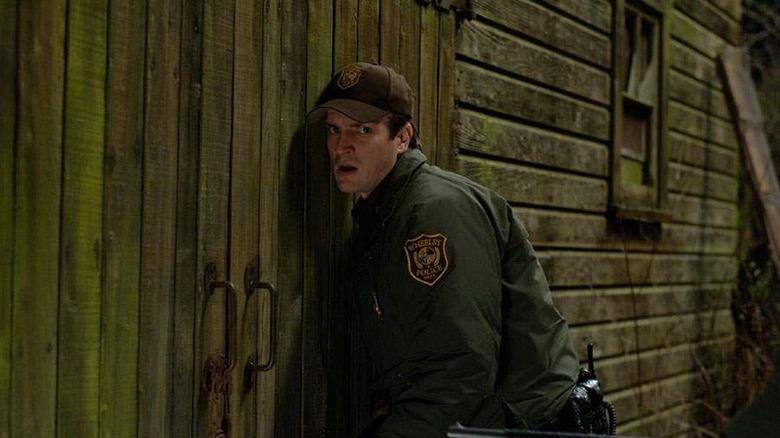James Gunn Gave Nathan Fillion Plenty Of Room To Play With His Slither Character
Some writer-directors are extremely intentional with their dialogue and don't appreciate it when actors decide to ad-lib, or even toss in their own ideas. But James Gunn is not one of those directors. In fact, he's known for letting his actors riff on various lines and he often throws out his own alternate take ideas in the middle of shooting, which can lead to some serious behind-the-scenes hilarity. (Seriously, Gunn and John Cena riffing with one another in the outtakes for "Peacemaker" season 1 is a thing of beauty.) Apparently, that's always been his way of doing things, as frequent collaborator and friend Nathan Fillion told IGN all about Gunn's on-the-fly directing style and how it led to some of the best moments in his directorial debut, "Slither," all the way back in 2006.
"Slither" is a gross-out horror-comedy that follows Fillion's character, Sheriff Bill Pardy, as he nurses his long-lasting love for his high-school sweetheart, Starla (Elizabeth Banks), whose husband Grant (Michael Rooker) ends up possessed by a parasitic alien. The two of them, along with the rest of the inhabitants of the fictional rural town of Wheelsy, South Carolina, must try to fight off Grant and his army of alien-slug-possessed zombies. That kind of situation might lead to some pretty strange exclamations in real life, and thankfully Gunn encouraged Fillion to lean into those inclinations.
Directing like a character from a deep-cut cult classic
When asked if Gunn was open to shooting takes different ways, Fillion explained:
"Extremely open. He'll let you change a line while shooting it, he'll shout out from across the room, 'Now say this!' (Laughs) That whole kind of, what was it, 'Shadow of the Vampire,' where the director is shouting out, 'You're scared, you're very, very scared! Not that scared.' And the guy's acting along the way, on the fly, I just thought that was brilliant. And then James Gunn actually did it for real."
There are two takeaways from this quote: first, working on one of Gunn's sets sounds like a lot of chaotic fun, and second, Fillion has great taste in weird movies about filmmaking. If you've never seen "Shadow of the Vampire," (and you should), Fillion is referring to a scene in which John Malkovich, playing "Nosferatu" director F.W. Murnau, begins directing his actors via shouting. It makes a lot of sense when you remember that "Nosferatu" was a silent film and his shouting really wouldn't matter, but I bet that Gunn's editors occasionally have to edit around his direction notes. Then again, if the final result is that audiences get to see the absolute best possible version of a take, there are far worse ways to direct.
Adding a bit of realism to ridiculous premises
Gunn not only lets his actors know when he wants them to try something different in a take, he also lets them improvise a bit and even uses their ideas (as long as they're good). Fillion told IGN:
"We were in rehearsals in the barn one time and I say, 'Well we better get you to a hospital right quick' and behind me, Wally, my co-star Don Thompson says, 'What the f*** they gonna do for her in a hospital?' And I turn around and I say, 'Shuuuut up,' because I'm trying to keep this woman calm obviously, but that wasn't the line ... and James said, 'You know what,' that's completely reasonable, that absolutely has to be said. It's in the movie."
Wally is one of Sheriff Pardy's deputies, and it's not hard to imagine a Sheriff telling one of his subordinates to shut up when saying something stupid, especially in front of the traumatized victim that needs transporting to the hospital. While that moment happened in rehearsals, there are also plenty of moments in the movie that feel as if they were done in the moment, because the reactions of the other actors are so genuine. It's like the chestburster scene in "Alien," but with jokes instead of mind-numbing terror!
Knowing his actors better than themselves
Perhaps the best part of Gunn letting his actors really dig into their characters and indulge their ideas is that he also knows how that plays into the feature as a whole. While filming "Slither," Fillion thought that his character was kind of a jokester, wise-cracking in dire moments. Instead, Pardy is the straight man to everyone else's lunacy, and his quips ended up cementing his relatable everyman nature. Fillion remembered talking about filming with his friends while playing video games (he's a "Halo" fan!) and how much fun he had kicking around his own character:
"I think it's really great to kick the piss out of your own character, and everybody was doing it. I thought to myself, 'We're making a very funny movie, I've got a very funny character. We seem to be making a lot of jokes,' yet in seeing the movie I discovered I was the straight man and I just didn't know it. I think that's brilliant and I think that's James Gunn. That's the story, that's the idea, that's the tone and I think that's what he created."
Gunn has since gone on to direct all kinds of movies, including the more family-friendly "Guardians of the Galaxy" films for Marvel and "The Suicide Squad" for DC, but his directing sensibilities have stayed the same. His actors are encouraged to dig deep into their characters and express themselves, and he seems to view filmmaking as a true collaborative effort. There's a warm, squishy heart at the center of almost everything Gunn makes, and the way he works with his actors probably has something to do with it.



